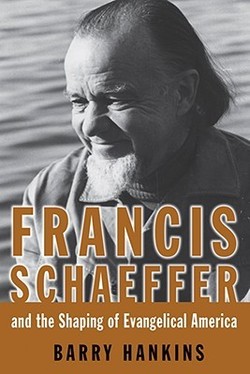 Francis Schaeffer and the shaping of Evangelical America by Barry Hankins is not a new book. It was published by Eerdmans in 2008, but I’m just now getting to it. It was a hard book to read. Schaeffer profoundly shaped my thinking as a young adult. The love with which the Schaefers received both European and American young people at L’Abri (“the Shelter”) in Huemoz, Switzerland, was as powerful an apologetic for his conservative Christian faith as his tireless teaching. Although I visited L’Abri only briefly in 1976 (and that at a time when the by-then-retired Schaeffers were away), I heard him speak several times, most notably at Covenant College in Lookout Mountain, Tennessee. Hankins’ summary of the contents of Schaeffer’s trilogy (The God Who is There, Escape From Reason, and He is There and He is not Silent) brought me back to the roots of much of my thinking that I have taken for granted for many years—the importance of worldview; the upper and lower stories that divorce faith and reason; the mannishness of man, separating us from the animal kingdom; the need to engage culture if we are going to win a world for Christ. Schaeffer was at heart an evangelist. I remember seeing him cry as he wrestled with the lostness of those who deny the deity of Christ and uniqueness of his power for salvation. I am not the only young adult of the ‘60s and early ‘70s who embraced Christian missions as my counter cultural alternative rather than drugs and sex that led only to emptiness and despair. Schaeffer’s emphasis on worldview jived with my studies in cultural anthropology that always included a section on how a group views their world and how that affects their material culture. That understanding, not of the answers, but of the question, helped me to keep my American mouth shut and listen to locals in Ethiopia, Brazil, Mozambique and other places where I have lived these past forty years.
Schaeffer’s push for evangelicals to engage culture and philosophy with a biblical worldview led me to change my major from cultural anthropology to philosophy in 1970. It confirmed what I was hearing from my parents, my church leadership and InterVarsity Christian Fellowship, the campus ministry I participated in—the truth doesn’t fear questions; it’s okay to wrestle with your faith; listen to what the world is saying and compare it to the revealed truth of Scripture before you swallow it whole. I knew that Schaeffer had come out of fundamentalism with its emphasis on separation from, not only the world, but also other Christians who interpret Scripture differently. I didn’t realize how much he had returned to those attitudes in his later years. Scholars of my generation who delved into philosophy and culture inspired by him, found weaknesses in his arguments. Although he reached defensible conclusions, the details of the argument often did not fit with the facts of history and were not even consistent in themselves. (And internal consistency was one of Schaeffer’s main apologetics for Christianity.) According to Hankins, Schaeffer didn’t want to hear about it. By the time of the “Battle for the Bible” in the 1970s, my husband and I were living overseas where quibbling over the difference between “verbal inerrancy” and “inerrant in all it affirms” seemed totally irrelevant to a world that needed to hear God speak. In recent years I have mourned the political polarization that keeps us from being able to talk to each other and work out solutions that address the concerns of both sides. It was painful to me (and I suspect to the author) to see how much my mentor Francis Schaeffer was instrumental in setting us on that road. Schaeffer died of cancer in 1984. His books and films How Shall We Then Live? and Whatever Happened to the Human Race (with C. Everett Koop) shocked the church into engaging with the pro-life movement. Predictions of euthanasia following abortion as acceptable to the secular world have come true in some states. I shudder to think what Schaeffer would have to say about gay marriage, immigration or the NRA today. I hope that his huge heart and passion for the lost would gentle his speech on the first two issues. Hankins quotes Os Guiness as saying, “He reasoned as if reason alone mattered; he loved as if love alone mattered” (p. 236). I suspect that Schaeffer and I would come to odds on the NRA. He feared a coming time when democracy would be so compromised by secular humanism that force might be justified to resist evil while I fear a current time when so many people are running around with guns that shoppers, movie goers, reporters and even school children die so that the warped mind of a malcontent might experience a rush of power and moment of false glory. Like I said, a hard book to read. My hero had feet of clay. Yet I cannot deny the direction his teaching sent me, viewing my world through the lens of Scripture, not what is politically correct. Schaeffer spoke to the issues of his time. His rationality-based teaching does not interest post-modern youth. The way he stumbled on details detracts from his credibilty. Hankins suggests that “calling Christians to the important task of worldview formation” might be Schaefer’s “signal achievement and most lasting influence” (p. 227). It certainly has been in my life.
0 Comments
Leave a Reply. |
AuthorLeAnne Hardy has lived in six countries on four continents. Her books come out of her cross-cultural experiences and her passion to use story to convey spiritual truths in a form that will permeate lives. Add http://www.leannehardy.net/1/feed to your RSS feed.
To receive an e-mail when I post a new blog, please subscribe.
Categories
All
Archives
November 2022
|
 RSS Feed
RSS Feed